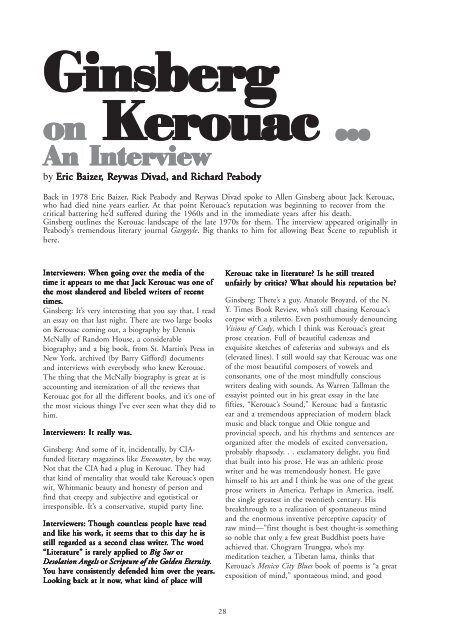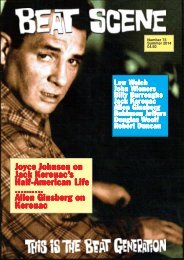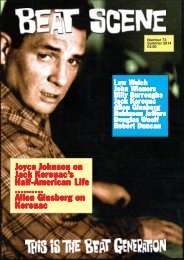Create successful ePaper yourself
Turn your PDF publications into a flip-book with our unique Google optimized e-Paper software.
Ginsberg<br />
on Kerouac ...<br />
An Interview<br />
by Eric Baiz<br />
aizer<br />
er, , Reywas Div<br />
ivad, and Richard Peabody<br />
Back in 1978 Eric Baizer, Rick Peabody and Reywas Divad spoke to Allen Ginsberg about Jack Kerouac,<br />
who had died nine years earlier. At that point Kerouac’s reputation was beginning to recover from the<br />
critical battering he’d suffered during the 1960s and in the immediate years after his death.<br />
Ginsberg outlines the Kerouac landscape of the late 1970s for them. The interview appeared originally in<br />
Peabody’s tremendous literary journal Gargoyle. Big thanks to him for allowing Beat Scene to republish it<br />
here.<br />
Interviewers: When going over the media of the<br />
time it appears to me that Jack Kerouac was one of<br />
the most slandered and libeled writers of recent<br />
times.<br />
Ginsberg: It’s very interesting that you say that, I read<br />
an essay on that last night. There are two large books<br />
on Kerouac coming out, a biography by Dennis<br />
McNally of Random House, a considerable<br />
biography; and a big book, from St. Martin’s Press in<br />
New York. archived (by Barry Gifford) documents<br />
and interviews with everybody who knew Kerouac.<br />
The thing that the McNally biography is great at is<br />
accounting and itemization of all the reviews that<br />
Kerouac got for all the different books, and it’s one of<br />
the most vicious things I’ve ever seen what they did to<br />
him.<br />
Interviewers: It really was.<br />
Ginsberg: And some of it, incidentally, by CIAfunded<br />
literary magazines like Encounter, by the way.<br />
Not that the CIA had a plug in Kerouac. They had<br />
that kind of mentality that would take Kerouac’s open<br />
wit, Whitmanic beauty and honesty of person and<br />
find that creepy and subjective and egotistical or<br />
irresponsible. It’s a conservative, stupid party line.<br />
Inter<br />
ntervie<br />
viewers:<br />
ers: Though countless people have e read<br />
and like his work, it seems that to this day he is<br />
still regar<br />
egarded as a second class writer. The word<br />
“Literature” is rarely applied to Big Sur or<br />
Desolation Angels<br />
or Scripture e of the Golden Eter<br />
ternity<br />
nity.<br />
You have e consistently defended him over the years.<br />
Looking back at it now, , what kind of place will<br />
Kerouac take in literature? Is he still treated<br />
unfairly by critics? What should his reputation be?<br />
Ginsberg: There’s a guy, Anatole Broyard, of the N.<br />
Y. Times Book Review, who’s still chasing Kerouac’s<br />
corpse with a stiletto. Even posthumously denouncing<br />
Visions of Cody, which I think was Kerouac’s great<br />
prose creation. Full of beautiful cadenzas and<br />
exquisite sketches of cafeterias and subways and els<br />
(elevated lines). I still would say that Kerouac was one<br />
of the most beautiful composers of vowels and<br />
consonants, one of the most mindfully conscious<br />
writers dealing with sounds. As Warren Tallman the<br />
essayist pointed out in his great essay in the late<br />
fifties, “Kerouac’s Sound,” Kerouac had a fantastic<br />
ear and a tremendous appreciation of modern black<br />
music and black tongue and Okie tongue and<br />
provincial speech, and his rhythms and sentences are<br />
organized after the models of excited conversation,<br />
probably rhapsody. . . exclamatory delight, you find<br />
that built into his prose. He was an athletic prose<br />
writer and he was tremendously honest. He gave<br />
himself to his art and I think he was one of the great<br />
prose writers in America. Perhaps in America, itself,<br />
the single greatest in the twentieth century. His<br />
breakthrough to a realization of spontaneous mind<br />
and the enormous inventive perceptive capacity of<br />
raw mind—”first thought is best thought-is something<br />
so noble that only a few great Buddhist poets have<br />
achieved that. Chogyarn Trungpa, who’s my<br />
meditation teacher, a Tibetan lama, thinks that<br />
Kerouac’s Mexico City Blues book of poems is “a great<br />
exposition of mind,” spontaeous mind, and good<br />
28





